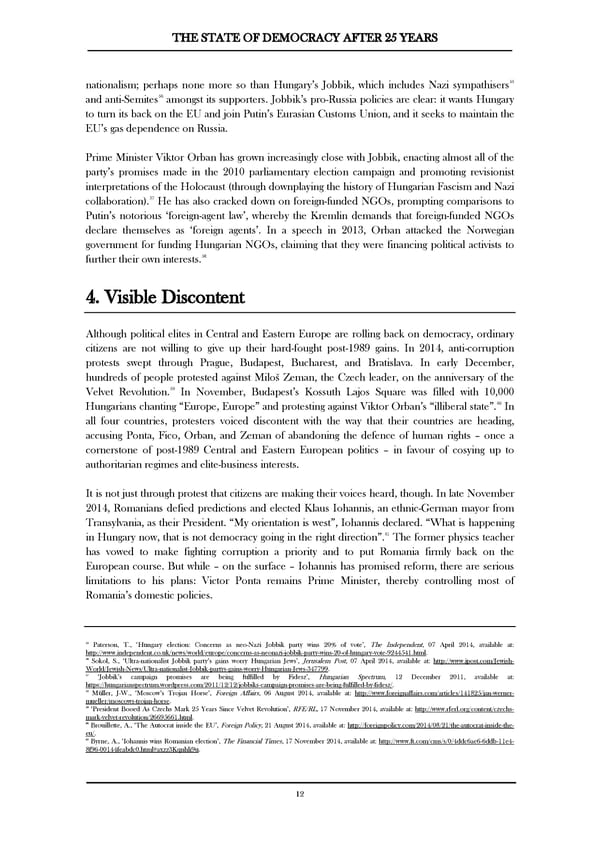THE STATE OF DEMOCRACY AFTER 25 YEARS 55 nationalism; perhaps none more so than Hungary’s Jobbik, which includes Nazi sympathisers 56 and anti-Semites amongst its supporters. Jobbik’s pro-Russia policies are clear: it wants Hungary to turn its back on the EU and join Putin’s Eurasian Customs Union, and it seeks to maintain the EU’s gas dependence on Russia. Prime Minister Viktor Orban has grown increasingly close with Jobbik, enacting almost all of the party’s promises made in the 2010 parliamentary election campaign and promoting revisionist interpretations of the Holocaust (through downplaying the history of Hungarian Fascism and Nazi collaboration).57 He has also cracked down on foreign-funded NGOs, prompting comparisons to Putin’s notorious ‘foreign-agent law’, whereby the Kremlin demands that foreign-funded NGOs declare themselves as ‘foreign agents’. In a speech in 2013, Orban attacked the Norwegian government for funding Hungarian NGOs, claiming that they were financing political activists to further their own interests.58 4. Visible Discontent Although political elites in Central and Eastern Europe are rolling back on democracy, ordinary citizens are not willing to give up their hard-fought post-1989 gains. In 2014, anti-corruption protests swept through Prague, Budapest, Bucharest, and Bratislava. In early December, hundreds of people protested against Miloš Zeman, the Czech leader, on the anniversary of the Velvet Revolution.59 In November, Budapest’s Kossuth Lajos Square was filled with 10,000 Hungarians chanting “Europe, Europe” and protesting against Viktor Orban’s “illiberal state”.60 In all four countries, protesters voiced discontent with the way that their countries are heading, accusing Ponta, Fico, Orban, and Zeman of abandoning the defence of human rights – once a cornerstone of post-1989 Central and Eastern European politics – in favour of cosying up to authoritarian regimes and elite-business interests. It is not just through protest that citizens are making their voices heard, though. In late November 2014, Romanians defied predictions and elected Klaus Iohannis, an ethnic-German mayor from Transylvania, as their President. “My orientation is west”, Iohannis declared. “What is happening in Hungary now, that is not democracy going in the right direction”.61 The former physics teacher has vowed to make fighting corruption a priority and to put Romania firmly back on the European course. But while – on the surface – Iohannis has promised reform, there are serious limitations to his plans: Victor Ponta remains Prime Minister, thereby controlling most of Romania’s domestic policies. 55 Paterson, T., ‘Hungary election: Concerns as neo-Nazi Jobbik party wins 20% of vote’, The Independent, 07 April 2014, available at: . http://www.independent.co.uk/news/world/europe/concerns-as-neonazi-jobbik-party-wins-20-of-hungary-vote-9244541.html 56 Sokol, S., ‘Ultra-nationalist Jobbik party’s gains worry Hungarian Jews’, Jerusalem Post, 07 April 2014, available at: http://www.jpost.com/Jewish- World/Jewish-News/Ultra-nationalist-Jobbik-partys-gains-worry-Hungarian-Jews-347799. 57 ‘Jobbik’s campaign promises are being fulfilled by Fidesz’, Hungarian Spectrum, 12 December 2011, available at: https://hungarianspectrum.wordpress.com/2011/12/12/jobbiks-campaign-promises-are-being-fulfilled-by-fidesz/. 58 Müller, J-W., ‘Moscow’s Trojan Horse’, Foreign Affairs, 06 August 2014, available at: http://www.foreignaffairs.com/articles/141825/jan-werner- mueller/moscows-trojan-horse. 59 ‘President Booed As Czechs Mark 25 Years Since Velvet Revolution’, RFE/RL, 17 November 2014, available at: http://www.rferl.org/content/czechs- mark-velvet-revolution/26695661.html. 60 Brouillette, A., ‘The Autocrat inside the EU’, Foreign Policy, 21 August 2014, available at: http://foreignpolicy.com/2014/08/21/the-autocrat-inside-the- eu/. 61 Byrne, A., ‘Iohannis wins Romanian election’, The Financial Times, 17 November 2014, available at: http://www.ft.com/cms/s/0/4ddc6ae6-6ddb-11e4- 8f96-00144feabdc0.html#axzz3Kqnhli9u. 12
 The State of Democracy After 25 Years Page 12 Page 14
The State of Democracy After 25 Years Page 12 Page 14